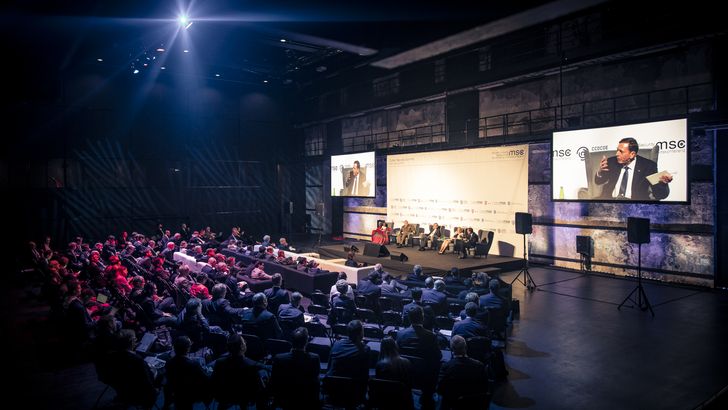

Disinformation and the COVID-19 pandemic – Digital Conversation by the Munich Security Conference
The Munich Security Conference brought together experts for a virtual discussion in a confidential setting on the risks of disinformation and the importance of strategic communication in light of the COVID-19 crisis. The core questions were what political risks the intentional dissemination of false information poses and how democracies can protect the digital space.
On May 5, 2020, the Munich Security Conference (MSC) hosted a discussion event on disinformation and strategic communication. Around 25 European and US experts from politics, international organizations and academia participated in the virtual debate. The MSC thereby continued its series of "Digital Conversations" on the COVID-19 pandemic and at the same time picked up on previous discussions on disinformation within its Cyber Security & Technology Series.
In view of rampant misinformation about the coronavirus and about the measures taken by governments worldwide, the High Representative for Foreign Affairs of the European Union (EU), Josep Borell, declared in March that a "global battle of narratives" was unfolding. The challenge for Brussels and European capitals in this "battle" is "communicating EU action and the added value of the Union to a skeptical (and in parts hostile) audience," said Wolfgang Ischinger and Boris Ruge, Chairman and Vice-Chairman of the MSC, in the run-up to the event. "What is needed is a truly strategic communications effort."
The participants of the MSC discussion agreed on the grave threat posed by government-engineered disinformation during the pandemic. These operations, participants explained, pursue two main objectives: on the one hand, to portray their respective governments as more capable crisis managers than for instance the US or European states; on the other hand, to flood the information landscape with a large amount of dubious claims in order to sow doubts about the facts of the pandemic. It was noted with concern that authoritarian states are increasingly pursuing similar goals in their information policies and are ostensibly learning from each other's tactics.
Accordingly, one focal point of the discussion was how democracies can effectively counter these tactics. Some participants warned that states are still not adequately equipped institutionally – and that this also applies to NATO or the EU. In addition, participants cautioned that democratic governments, in combating disinformation, might inadvertently legitimize authoritarian regulation of the information landscape. For example, measures that make excessive use of content censorship could play into the hands of the authoritarian narrative that information in general can be a source of danger. Beyond uncovering and fending off disinformation, initiatives should aim at constructively and proactively shaping a democratic "information architecture". For instance, participants listed Internet, data and cyber security standards – at the national and international level – that promote democratic values and prevent authoritarian interference. It is also crucial that there be more consistent and formalized cooperation between governments and the private sector to address the mechanisms that favor the spread of disinformation on various platforms.
About the "MSC Digital Conversations"
The MSC has set itself the task of making the COVID-19 pandemic the focus of its activities for the immediate future. In the coming weeks and months, the MSC will be staging a series of high-level events called "MSC Digital Conversations" to examine the security implications of the COVID-19 pandemic and promote dialogue between high-ranking representatives from government, academia, NGOs, international organizations and the private sector. MSC Digital Conversations are typically small, confidential meetings under Chatham House Rule. Selected events will be open to the public. Several Digital Conversations will take place each month.
The MSC has acknowledged early on that local health issues have the potential to evolve into full-fledged international security crises. Aware of the need for international action, the MSC partnered with the World Health Organization, the Bill & Melinda Gates Foundation, the Center for Strategic and International Studies, Chatham House, and Merck, to promote the discussion and collaboration between health officials, NGO leaders, security strategists, the private sector, and decision-makers. Within its Human Security Series, the MSC has been organizing events and conferences on health-related challenges since 2016. Moreover, health security has become an integral part of the MSC's annual conference in Munich as well as its Munich Leaders Meetings. Additionally, a chapter in the annual Munich Security Report regularly focuses on health security issues.


